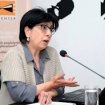“The Role of External Factors in the Karabakh Process - 2018: Mediators, Regional Actors and International Organizations”: Page 8 of 8
conflict looks like to the conflict parties, interested regional superpowers and mediators. The parties to the conflict in the best-case scenario have discordant (Yerevan and Stepanakert), and in the worst-case scenario - diametrically opposite approaches (Baku and Stepanakert). Before the change of power in May 2018, Yerevan considered the “territories in exchange for status” formula an acceptable option according to which territories, situated to the east and south of the currently abolished borders of the former Autonomous Region of Nagorno Karabakh could be transferred to Azerbaijan’s control. Azerbaijan would acknowledge the right of the people of Artsakh to the independent determination of the status of the province. Baku refuses to acknowledge this right of the citizens of Artsakh, however, it is ready to receive the above-mentioned territories in exchange for guarantees of reducing military activity along the contact line. An option of self-determination is being considered in Baku for the population of Artsakh within the frames of territorial integrity or sovereignty within Azerbaijan. Stepanakert (which does not have any direct participation in the negotiations) believes that the issue of Artsakh’s status has been resolved by means of self-proclamation, and the issue of territorial demarcation with Azerbaijan is considered in the context of potential exchange of formerly Armenian-populated territories currently under Azerbaijan’s control with some territories, previously populated by Azerbaijanis and currently under the control of the Artsakh authorities. Roughly summarizing what has been said, we can characterize the positions of the parties as follows:
Baku wants to bring the situation with the status and territories to the pre-conflict state, Stepanakert wants to reinforce the situation formed as a result of the 1991 - 1994 war de jure, whereas Yerevan is proposing to agree to a certain mix of the positions of Baku and Stepanakert. The regional superpowers are concerned that this or that resolution does not affect their own interests, have a negative impact on their military, political and economic interests, and diminish their security.
To a certain extent, mediators consider the final settlement in the context of their own mid-term and long-term interests in the Middle East, South Caucasus, and Central Asia. Meanwhile, the principles of the resolution proposed to them are contradictory to each other and are counterposed by the parties to the conflict; a theoretical struggle is taking place to define the prevalence among the principles from the viewpoint of the international law. A completely fruitless occupation.







 +37410 563363
+37410 563363
 1/3 Buzand Str, 8 Floor, Yerevan, Armenia
1/3 Buzand Str, 8 Floor, Yerevan, Armenia